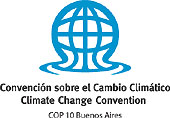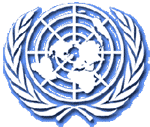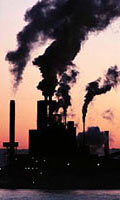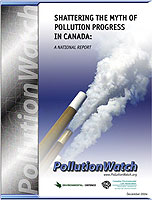
News |
- Power Companies Not Seeking Climate Change Solutions
- COP 10 Climate Change Meetings Conclude
- 'Environmental Flows' May Solve Conflict Over Water
- Civil Society Concerns at COP 10
- Series Wins Environmental Reporting Award
- Hydro Symposium Sparks Controversy
- Aboriginal Peoples Object to Great Lakes Annex
- First African Woman Awarded Nobel Peace Prize
- Climate Change Linked to Poverty
- Kyoto Legislation Needed in 2005
- Canada's Rising Pollution Problem
- A Developing Boreal Storm
| Power Companies Not Seeking Climate Change Solutions | 11 January 05 |
 Despite their role as the biggest contributors to climate change, a new report by the WWF reveals that the planet's largest power companies are failing to make use of available technologies to address the threat that climate change poses to the environment. Despite their role as the biggest contributors to climate change, a new report by the WWF reveals that the planet's largest power companies are failing to make use of available technologies to address the threat that climate change poses to the environment.Ranking Power, a new WWF report, analyzes 72 of the world's leading power companies, which among them produce two thirds of all electricity generated in Organization for Economic Cooperation and Development (OECD) countries and Russia. The report documents the overall failure of these major power sector companies around the world to significantly invest in renewable and efficient energy in order to reduce their greenhouse gas emissions. Almost two thirds of the companies evaluated received a score of less than one out of a possible ten for their response to global warming, with more than 90% rating below three. Rankings are based on the companies' current use of available technologies to reduce CO2 emissions, as well as clear commitments they have made for future improvements. View the full news release from WWF US View the WWF publication, Ranking Power (PDF) Visit the WWF campaign PowerSwitch website Source: WWF US
|
|
| COP 10 Climate Change Meetings Conclude | 07 January 05 |
 The Tenth Conference of the Parties (COP 10) to the UN Framework Convention on Climate Change (UNFCCC) marked the 10th anniversary of the entry into force of the United Nations Framework Convention on Climate Change and concluded in Buenos Aires on December 17, 2004. The Tenth Conference of the Parties (COP 10) to the UN Framework Convention on Climate Change (UNFCCC) marked the 10th anniversary of the entry into force of the United Nations Framework Convention on Climate Change and concluded in Buenos Aires on December 17, 2004. At the 12-day conference in Buenos Aires, parties to the UNFCCC prepared for the imminent entry into force of the Kyoto Protocol, and skirmished again over the terms for possible consideration of next steps in the international climate effort. Negotiators also tied up loose ends on technical aspects of the Protocol, produced a modest new "Buenos Aires Work Programme" on adaptation, and agreed to convene a "Seminar of Government Experts" in May 2005 that provides an opening for discussing possible future efforts but explicitly "does not open any negotiations leading to new commitments." The Tenth Session of the Conference of the Parties came against the backdrop of Kyoto's entry into force with Russia's ratification in November, setting the Protocol to take effect on February 16, 2005. The Protocol establishes the first binding international commitments to limit greenhouse gas emissions and an international emissions trading system to promote cost-effective reductions. Visit the Tenth Conference of the Parties to the UN Framework Convention on Climate Change website View the UNFCC press release at the close of COP 10 (PDF) View IISD coverage of the Tenth Conference of the Parties to the UN Framework Convention on Climate Change View reports released by the Pew Centre on Global Climate Change during COP 10 View the Pew Centre on Global Climate Change summary of COP 10 View Manitoba Wildlands' previous coverage of COP 10 Sources: UNFCC, IISD, Pew Centre on Global Climate Change |
|
| 'Environmental Flows' May Solve Conflict Over Water | 07 January 05 |
 A survey of 272 experts and professionals in water management worldwide shows strong interest and support for environmental flows, yet slow progress in its implementation. An "environmental flow" is the water regime provided within a river, wetland or coastal zone to maintain ecosystems and their benefits where there are competing water uses and where flows are regulated. A survey of 272 experts and professionals in water management worldwide shows strong interest and support for environmental flows, yet slow progress in its implementation. An "environmental flow" is the water regime provided within a river, wetland or coastal zone to maintain ecosystems and their benefits where there are competing water uses and where flows are regulated.The study examines how the concept of environmental flows is being interpreted and applied within water management practice and policy around the world. It analyses why certain regions do not recognize or apply the concept and how these regions are otherwise addressing environmental concerns in water management. It also looks at the most critical obstacles to further understanding and implementing the concept and some of the common concerns of people involved in water management and policy. The Linköping University study was a collaborative project with the Stockholm International Water Institute, the International Water Management Institute, IUCN (The World Conservation Union), with financial support provided by the Swedish Water House. View the research report 'Perceptions and Interpretations of Environmental Flows...' (PDF) View the October 8, 2004 press release (PDF) Visit the Water and Nature website for environmental flows information View the August 19, 2004 IUCN press release (PDF) Sources: IUCN, Linköping University |
|
Civil Society Concerns at COP 10 |
04 January 05 |
 Non-governmental organizations (NGOs) from around the globe took their voices and concerns to the 10th Conference of the Parties (COP 10) for the United Nations Framework Convention on Climate Change (UNFCCC). Non-governmental organizations (NGOs) from around the globe took their voices and concerns to the 10th Conference of the Parties (COP 10) for the United Nations Framework Convention on Climate Change (UNFCCC).The Confederal Secretary for Occupational Health, Safety & Environment in Spain's trade union Comisiones Obreres explained that history shows that only politicians backed by an informed and active citizenry are in a position to carry out contentious policies. JoaquÍn Nieto argued that this is a major reason for social partners to support the efforts of trade unions to bring workers and workplaces into the debate over climate change. The Climate Justice Programme, with collaborative support from Greenpeace, Friends of the Earth International and WWF drew attention to climate change litigation, citing ten cases to enforce laws to combat climate change, covering seven countries around the world. Human rights and environmental organizations participating in COP 10 condemned many key mechanisms to aid in the reduction of greenhouse gases (GHG). At the top of the list was the Clean Development Mechanism, which allows Northern countries to evade limits on their carbon emissions, by setting up projects in Southern countries, including "cheap" carbon "sinks" such as large-scale tree plantations. Current carbon trading schemes were criticized as involving governments, export credit agencies, corporations financial institutions- that continue to invest in and support fossil fuel exploitation and use. The people whose land, air and water, and lives are most directly affected by emissions are not part of carbon trading schemes. The Institute for Policy Studies released an expose of the biggest carbon trading proponent, the World Bank. Wrong Turn From Rio: The World Bank's Road to Climate Catastrophe demonstrates how the World Bank has systematically transformed Kyoto tools including carbon-trading schemes into mechanisms for institutional profit while maintaining the status quo. Visit the Climate Justice Programme website View Global Justice Ecology Project coverage of COP 10 View Wrong Turn From Rio: The World Bank's Road to Climate Catastrophe from the Institute for Policy Studies, the Sustainable Energy and Economy Network, and the Transnational Institute (PDF) Download the December 2004 Buenos Aires Draft Declaration on the Ethical Dimensions of Climate Change (PDF) View Friends of the Earth International COP coverage Sources: Global Justice Ecology Project, Climate Justice Programme, IISD |
|
Series Wins Environmental Reporting Award |
04 January 05 |
 Sacramento Bee staff writer Tom Knudson was awarded the Reuters-IUCN Award for Excellence in Environmental Reporting in Bangkok, Thailand Thursday, Nov. 18, 2004. Sacramento Bee staff writer Tom Knudson was awarded the Reuters-IUCN Award for Excellence in Environmental Reporting in Bangkok, Thailand Thursday, Nov. 18, 2004.Knudson was recognized for his series of articles entitled "State of Denial". Knudson's specialty - reporting on national and global environmental issues has taken him from the deserts of West Africa to the tropics of the Amazon, from Canada's boreal forest to Mexico's Sea of Cortez. The IUCN, called the World Conservation Union, honors one writer per year in a worldwide contest of environmental journalism. The judging panel described his work as "a thorough investigation into California's consumption patterns and environmental footprint on other parts of the world." "State of Denial" ran in The Sacramento Bee on April 27, 2003. The stories took an in-depth look at California's strict environmental policies and contrasted them with the international environmental impact of the state's importing and consumption habits. In Chapter Two: Scarring the Boreal, Knudson profiles Canada's Boreal forests as a primary source of forest products for timber and paper-hungry American markets. The Sacramento Bee is the second-largest newspaper in Northern California. Knudson visited Manitoba, including East Side Lake Winnipeg communities prior to writing his award winning series. View the award-winning series of articles by Tom Knudson - "State of Denial" Visit the IUCN web site for details on the Award for Excellence in Environmental Reporting View the Reuters Foundation - IUCN press release (PDF) Sources: Sacramento Bee, IUCN |
|
Hydro Symposium Sparks Controversy |
23 December 04 |
 Prominent NGOs present at a United Nations Symposium on Hydropower and Sustainable Development in October 2004 say the UN pandered to big dam developers. In a November 22, 2004 letter to the UN, six NGOs including International Rivers Network and Oxfam say "the conference was heavily biased in favor of large hydropower and the participation of NGO representatives was systematically marginalized." Prominent NGOs present at a United Nations Symposium on Hydropower and Sustainable Development in October 2004 say the UN pandered to big dam developers. In a November 22, 2004 letter to the UN, six NGOs including International Rivers Network and Oxfam say "the conference was heavily biased in favor of large hydropower and the participation of NGO representatives was systematically marginalized."Kui-Nang Mak, the UN official to whom the letter is addressed, told Manitoba Wildlands he was "quite satisfied" with the range of participation at the Beijing symposium. "A large number of viewpoints," he said "[were] adequately accommodated." The NGOs cite other procedural biases stating, "systematic exclusion of NGOs and their voices has violated the generally established UN practices." As for the allegations, Mak said little other than that the symposium was not an "independent UN" event, but was co-organized by the Government of China. The event also received funding from the World Bank, which has a legacy of strife with NGOs over dam projects. Mak said a reply to the NGOs will be forthcoming. View the NGO letter to the UN View International Rivers Network information on the UN symposium View the Beijing symposium declaration Sources: International Rivers Network, Manitoba Wildlands |
|
Aboriginal Peoples Object to Great Lakes Annex |
23 December 04 |
 At least 75 tribal chiefs and representatives from both sides of the Great Lakes met to discuss their common concerns regarding the draft 2001 Great Lakes Annex Implementing Agreements November 23, 2004 at Kewadin Convention Center, Sault Ste. Marie, Ontario. At least 75 tribal chiefs and representatives from both sides of the Great Lakes met to discuss their common concerns regarding the draft 2001 Great Lakes Annex Implementing Agreements November 23, 2004 at Kewadin Convention Center, Sault Ste. Marie, Ontario.The Aboriginal communities are objecting to their exclusion from state and provincial water diversion agreements, which they feel will affect their known treaty and traditional water rights. Their meeting hammered out their joint demand to be heard and prepare a "Tribal and First Nation Great Lakes Water Accord" stated in terms all tribal entities can accept and approve. Chris McCormick, Grand Chief of the Association of Iroquois and Allied Nations in central Canada stated that the Canadian provinces do not have the power to treaty with native groups and do not represent them in matters connected to First Nations treaties. While the state and provincial parties to the "Annex" pledged to consult with native tribes, Grand Council Chief John Beaucage, co-chairman of the gathering, said that consultation only came after the deal was struck and that Aboriginal peoples were not involved in the creation of the draft "Annex" implementing agreements. View the Soo Evening News article View Manitoba Wildlands' November 22, 2004 news item View Manitoba Wildlands' September 29, 2004 news item View Manitoba Wildlands' August 18, 2004 news item |
|
First African Woman Awarded Nobel Peace Prize |
20 December 04 |
 Kenyan environmentalist Wangari Maathai became the first African woman to receive a Nobel Peace Prize when she accepted the award to a standing ovation at a ceremony in Oslo, Norway on December 10, 2004. Kenyan environmentalist Wangari Maathai became the first African woman to receive a Nobel Peace Prize when she accepted the award to a standing ovation at a ceremony in Oslo, Norway on December 10, 2004.Ms. Maathai founded a campaign that has planted 30 million trees across Africa. She will use the funds from the award to expand her Green Belt Movement around the world. The movement, led mostly by women, aims to produce firewood, building materials and to slow deforestation. Kenya has lost about 90 percent of its forests in the past 50 years. The movement also works for women's rights, democracy and peace. Calling humanity a threat to the planet, during her acceptance address for the Nobel Peace Prize, Ms. Maathai urged democratic reform and an end to corporate greed. She said sweeping changes were needed to restore a "world of beauty and wonder" by overcoming challenges ranging from AIDS to climate instability. She called on people around the world to plant trees at Easter as a symbol of renewal and to protect the planet. Ms. Maathai dismissed critics who say environmentalists do not warrant the Nobel prize. "The state of any country's environment is a reflection of the kind of governance in place, and without good governance there can be no peace," she said. The Nobel Prizes were set up in the 1895 will of Swedish philanthropist Alfred Nobel, 10 years before Norway won independence from Sweden. View the Planet Ark news stories on Nobel Laureate Wangari Maathai: first, second View the Nobel Peace Prize website Read Wangari Maathai's Nobel Lecture Source: Reuters News Service via Planet Ark |
|
Climate Change Linked to Poverty |
20 December 04 |
 A new international coalition of environmental and development organizations released a report entitled Up in Smoke which states that global warming threatens to reverse human progress, and make the international targets (known as the Millennium Development Goals) to cut in half global poverty by 2015 unattainable. A new international coalition of environmental and development organizations released a report entitled Up in Smoke which states that global warming threatens to reverse human progress, and make the international targets (known as the Millennium Development Goals) to cut in half global poverty by 2015 unattainable.The report, released October 20, 2004, highlights concerns about the serious impact that global warming is already having on some of the world's poorest communities. The coalition - calling themselves The Working Group on Climate Change and Development - says that the world must face up to the inseparable challenges of poverty and a rapidly warming global climate. The Working Group on Climate Change and Development is comprised of: ActionAid International, Christian Aid, Columbian Faith and Justice, IDS (Institute of Development Studies), ITDG (Intermediate Technology Development Group), IIED (International Institute for Environment and Development), Friends of the Earth, Greenpeace, nef (new economics foundation), Operation Noah, Oxfam, People & Planet, RSPB, Tearfund, teri Europe, WWF, WaterAid, World Vision. View the New Economics Foundation press release View the Working Group on Climate Change and Development report: Up In Smoke Source: The New Economics Foundation |
|
Kyoto Legislation Needed in 2005 |
20 December 04 |
 While Kyoto becomes international law on February 16, 2005, Canada's Kyoto implementation is stalled because of a lack of domestic laws and regulations, says a progress report on Canada's Kyoto implementation published December 17, 2004 by the Sierra Club of Canada. While Kyoto becomes international law on February 16, 2005, Canada's Kyoto implementation is stalled because of a lack of domestic laws and regulations, says a progress report on Canada's Kyoto implementation published December 17, 2004 by the Sierra Club of Canada."Despite good words and good intentions, the federal government has not yet delivered real reductions. Unless the 2005 budget and next Parliamentary session deliver real progress, Canada's reputation and performance will be an international embarrassment" said Elizabeth May, Executive Director of the Sierra Club of Canada. The Sierra Club of Canada's second annual Kyoto Report Card examines government progress toward meeting its targets for reducing greenhouse gas emissions as laid out under Action Plan 2000 and the Climate Change Plan for Canada 2002. View the Sierra Club of Canada press release Download the Sierra Club of Canada Kyoto Report Card 2004 (PDF) View the 2000 Climate Change Plan (PDF) Source: Sierra Club of Canada |
|
Canada's Rising Pollution Problem |
16 December 04 |
 Canada has more pollution than it had 10 years ago and neither industry nor government is doing much to reverse the trend, says a report released Wednesday, December 8, 2004. Canada has more pollution than it had 10 years ago and neither industry nor government is doing much to reverse the trend, says a report released Wednesday, December 8, 2004.The report, Shattering the Myth of Pollution Progress in Canada: A National Report, co-authored by Environmental Defence Canada and the Canadian Environmental Law Association, condemns both government and industry for not doing enough to reduce pollution. According to the report, approximately 4.19 billion kilograms of pollutants - including some that can cause cancer, asthma and other health problems - were released into the country's air, land or water in 2002. Overall emissions of chemicals that were tracked continuously from 1995 to 2002 jumped by 49 per cent to 296 million kilograms. The report is based on information from 1995 to 2002 submitted by industry to the National Pollutant Release Inventory, a federal database that tracks emissions across Canada. In 2002, the most recent year for which numbers are available, the database monitored emissions of 274 chemicals, including carbon monoxide and sulphur dioxide from 4,652 facilities. View the December 8, 2004 CBC news story Visit the Environmental Defence Canada web site View the Environmental Defence Canada Press release Visit the Canadian Environmental Law Association web site |
|
A Developing Boreal Storm |
16 December 04 |
 DeNeen L. Brown, Washington Post staff writer accompanied Robert Kennedy Jr. on his June 2004 tour of Manitoba Northern communities, and boreal forest regions. We are providing Ms. Brown's personal account of her time with Poplar River First Nation citizens and elders. DeNeen L. Brown, Washington Post staff writer accompanied Robert Kennedy Jr. on his June 2004 tour of Manitoba Northern communities, and boreal forest regions. We are providing Ms. Brown's personal account of her time with Poplar River First Nation citizens and elders.View the article In The Boreal Forest, A Developing Storm by DeNeen L. Brown (DOC) |
|


 RSS Feeds:
RSS Feeds: